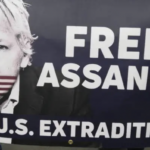Political Voices Unite Against Four-Year-Long Detention of Assange

Independent member for Clark Andrew Wilkie has been leading the Australian parliamentary campaign to see the persecution of Australian publisher Julian Assange brought to an end, even before his slow torture remanding in Belmarsh prison commenced four years ago.
The Bring Julian Assange Home Parliamentary Group was founded in October 2019 by Wilkie and strange bedfellow then Liberal Nationals MP George Christensen, which is a partnership that highlighted that the cause for Assange and that of free speech transcends all political divides.
And with great droves of the voting public having shifted away from the fossil fuel-obsessed major parties last election, the support for Julian in parliament has only grown, with progressives like Greens Senator David Shoebridge and teal independent Dr Monique Ryan now lending their voices.
Of course, after being detained in London’s maximum-security prison since 11 April 2019, the Townsville-born son’s physical and mental health continues to worsen, which makes the rising calls for his release coming from parliamentarians the world over last week all the more vital.
In his home country, 48 Australian MPs and senators, which significantly included 13 members of the Labor government, sent an open letter to US attorney general Merrick Garland, imploring the chief lawmaker of “our closest strategic ally” to drop the extradition proceedings and send him home.
A blurring of jurisdiction
“If the extradition request is approved, Australians will witness the deportation of one of our citizens from one AUKUS partner to another – our closest strategic ally – with Mr Assange facing the prospect of spending the rest of his life in prison,” the open letter from Australian MPs reads.
“This would set a dangerous precedent for all global citizens, journalists, publishers, media organisations and the freedom of the press,” the Australian MPs continue. “It would also be needlessly damaging for the US as a world leader on freedom of expression and the rule of law.”
The document further outlines that the June 2020 US indictment against Assange, contains 17 counts under the Espionage Act 1917 (US) and one hacking charge contained in the Computer Fraud and Abuse Act 1968 (US), which all relate to his publishing of leaked classified US government files.
As Assange Campaign legal advisor Greg Barns has long pointed out, it’s the US claim to extraterritoriality, whereby it has reached out across international borders to detain and prosecute a foreign national over acts committed in another country, that’s threatening a global free press.
And the letter underscores the strength of international support for Julian, which includes former UN special rapporteur on torture Nils Melzer, Council of Europe commissioner for human rights Dunja Mijatović, as well as “various heads of state and parliamentarians from around the world”.
Enough is enough is enough
The list of 53 parliamentarians making up the Bring Julian Assange Home Parliamentary Group has recently been updated and, somewhat conspicuously, the name of prime minister Anthony Albanese has been removed, after it had appeared there since his time in opposition.
Although at the bottom of the page there remains the well-known response the Labor leader gave to a question about the case put to him in parliament in February 2021 that saw him remark, “Enough is enough”, which is a catchphrase now bandied about so often it’s lost all its meaning.
The support that Albanese portrayed in terms of Assange whilst in opposition led many to harbour the hope that the long neglected Australian journalist might finally receive the necessary assistance that’s needed from his own country, and which was so blatantly denied under Morrison.
In response to a question about the representations his government had been making to secure Assange’s release since recently having taken office during a 31 May 2022 presser, Albanese told reporters that “not all foreign affairs is best done with the loud hailer”.
And subsequent questions put to the PM along the way have all received a rehashed version of that same answer, which is supposed to convey that he’s been attempting to officially assist Assange but can’t reveal anything about it.
However, a year on, grassroots consensus is that the Albanese government has been doing next to nothing in terms of trying to secure the WikiLeaks founder’s return to this country.
Indeed, since February, foreign minister Penny Wong has twice stated that Assange’s case has “dragged on too long” – another way of saying “enough is enough” – which she advises is her government’s official stance on the journalist: a weak position if ever there was one.
And whilst she’s been delivering this policy position, Wong has also underscored that, while she and the PM have supposedly asked US officials to drop the extradition, the US and the UK court systems are operating under the rule of law, so our nation’s hands are basically tied in intervening.
Global support
Thirteen Labor MPs speaking out in support of Assange is significant, considering their leader’s lack of any tangible action in regard to an Australian citizen, who, our closest ally, the US has been employing extralegal and, at times, even illegal measures to destroy him mentally and physically.
But speaking out in support of Assange has long been a risk for most local politicians due to the smear campaign Washington, London and Canberra have tarred him with, whether that be around assertions that his publishing actions were criminal to the claim that he’s not even a real journalist.
The UK courts initially denied extradition due to Assange’s deteriorating mental condition as he couldn’t survive extreme US detention. But this was overturned on appeal, as Washington promised not to subject him to its harshest prison conditions, unless the nation changes its mind.
Following the decision on appeal, then UK home secretary Priti Patel greenlighted extradition last June, and now, Assange’s legal team is launching two more final appeals: one with the UK High Court and the other with the European Court of Human Rights.
And Julian’s support is strong elsewhere as well. Thirty seven British MPs and Lords also forwarded an open letter to the US attorney general last week, as did a group of US Democrats, dozens of Mexican parliamentarians and 99 members of Brazil’s parliament.
The Australian politicians who wrote to Garland further pointed out to the AG that public opinion to see Assange returned to this country is growing locally, with 88 percent of Australians in support of his return or unopposed to it.
The open letter authors also stress that in including his time hauled up in London’s Ecuadorian Embassy, in an attempt to avoid potential US extradition, Assange has been effectively incarcerated for over a decade, yet he’s never been convicted of any serious crime.
“A clear majority of Australians consider that this matter has gone on for far too long and must be brought to a close,” the open letter ends. “We implore you to drop the extradition proceedings and allow Mr Assange to return home.”







